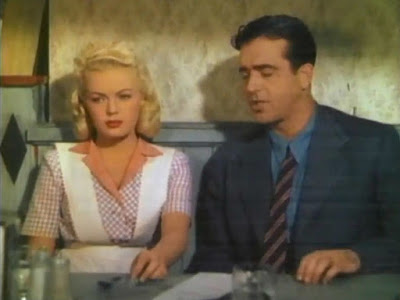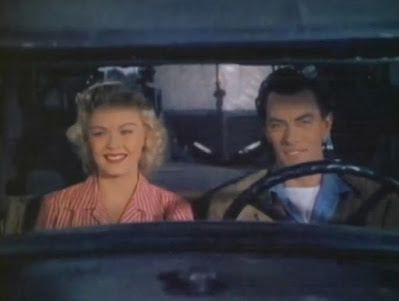 |
| George Brent and Lucy |
LOVER COME BACK (1946). Director: William A. Seiter.
"Jealousy is a particularly crude manifestation of the uncultured."
"Your complete and unashamed lack of principles almost amounts to integrity."
"That's different -- I'm a man!"
Executive Kay Williams (Lucille Ball) cleverly fobs off a variety of wolves, including her boss, while her husband, Bill (George Brent), a war correspondent, is overseas. When he returns home, Kay discovers that he had a number of dalliances with women, including his photographer Madeline (Vera Zorina of On Your Toes). She decides to get even by pretending that she also saw different men while he was gone -- and after. Madeline waits hopefully in the wings, while Kay's in-laws -- Bill Sr. (Charles Winninger) and his wife (Elisabeth Risdon) -- offer conflicting advice to both parties and bicker with each other. Will the younger couple work out their problems or wind up in Reno?
 |
| Elisabeth Risdon and Charles Winninger |
Lover Come Back is a breezy and delightful film bolstered by excellent performances from the entire cast, with Lucy being especially bright-eyed, effective, and resplendent. This is a clear example that Ball's talent did not begin and end with the wonderful I Love Lucy. Brent gives one of his more memorable performances, and one can't say enough about the terrific Winninger and Risdon, who make quite a pair of nattering lovebirds. Then we've got Austrian actor Carl Esmond as dapper and aggressive Paul, who wants to marry Kay; William Wright (of Philo Vance Returns) as photographer Jimmy, who makes frequent passes; Raymond Walburn (of And the Angels Sing) as Kay's amorous boss J. P. Winthrop; Wallace Ford as the lawyer Tubbs, who switches sides in this battle of the sexes after he gets punched; and spirited Louise Beavers as the couple's lovable domestic, Martha. Others in the cast who appear briefly are Franklin Pangborn as a hotel clerk; Ellen Corby as a secretary; and Joan Shawlee as one of Bill's rather bitchy ex-girlfriends.
 |
| Lucy! |
One could easily argue that
Lover Come Back is a slight picture were it not for the feminist sub-text. The picture argues against the double standard that it's acceptable for men to cheat -- "I'm a man, after all!" -- but that it's somehow worse for women to do so. The screenplay by Michael Fessier and Ernest Pagano is also full of good dialogue, and while the flick is not a laugh-riot it is consistently amusing. Brent is a likable enough performer so that his slightly sleazy character -- despite his love for his wife -- is made more palatable. This was the last of nine films for the German actress and dancer Vera Zorina, who has a certain undeniable appeal. As for Lucy, she is just splendid and looks absolutely gorgeous throughout!
Verdict: Lucy leads a cast of pros in an amusing comedy. ***.










































